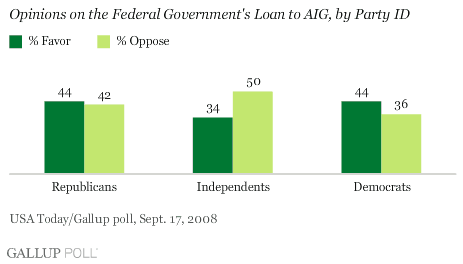PRINCETON, NJ -- While there seems to be widespread support for the recent bailout of AIG in Washington, D.C., and the financial markets, the results of a new USA Today/║┌┴¤═° poll show Americans evenly split on whether the federal government should have loaned money to the insurance company.

Independents Most Widely Opposed to the Bailout
As the financial crisis has unfolded during recent weeks, the Treasury Department and the Federal Reserve Board of Governors have acted to preserve financial stability by helping a number of individual financial companies deemed "too big to fail" to avoid going into bankruptcy. While leaders of both political parties and many on Wall Street have supported these "bailouts," the general public is essentially split over the wisdom of the most recent effort to assist AIG.
Significantly, members of both parties are split on this issue: 44% of Republicans are in favor while 42% are opposed, and 44% of Democrats are in favor with 36% opposed. However, independents oppose the government's loan to AIG by a 50% to 34% margin. Men oppose the AIG loan by 49% to 38% while women support it by 42% to 36%. Whites and nonwhites are also evenly split on this issue.


Commentary
Many of the actions taken by the Treasury and the Fed during the current financial crisis are unprecedented. The concept that a financial company could become "too big to fail" -- meaning if it went into bankruptcy, the repercussions for the entire financial system would be so great as to threaten the system's collapse -- has been around for a long time. While it has been debated, no one has ever really defined how it might be measured or which financial companies might be so large that they qualify for such a special status.
Many on Wall Street, in the banking business, and in the nation's capital seem to believe that the public sees risk to the financial system in the same way they do. However, as this new USA Today/║┌┴¤═° poll shows, that is not necessarily the case. Many Americans feel this "bailout" process is unfair and that those who profit from our free-market system should pay the consequences when they fail.
Over the last few weeks, there have been a series of major financial-firm bailouts and one notable exception: Lehman Brothers. To this point, all of these actions seem justified based upon the risk assessments made by numerous public officials. Going forward, however, those at the Fed and the Treasury should keep in mind that . If they don't, they may join Securities and Exchange Commission Chairman Christopher Cox in the ranks of those who have been called on to resign in the face of the current financial debacle.
Further, this opposition to taxpayer bailouts also suggests that the rumored "New Resolution Trust Corporation" that sent stocks surging Thursday may not have smooth sailing with the American people or the Congress. In fact, it may well become an election issue, particularly if such a new entity is widely seen as simply a way to bail out Wall Street and the banking industry.
Survey Methods
The results reported here are based on 1,056 interviews completed Sept. 17, 2008. For results based on this sample, the maximum margin of sampling error is ┬▒4 percentage points.
Interviews are conducted with respondents on land-line telephones (for respondents with a land-line telephone) and cellular phones (for respondents who are cell-phone only).
Polls conducted entirely in one day, such as this one, are subject to additional error or bias not found in polls conducted over several days.
In addition to sampling error, question wording and practical difficulties in conducting surveys can introduce error or bias into the findings of public opinion polls.
To provide feedback or suggestions about how to improve ║┌┴¤═°.com, please e-mail feedback@gallup.com.
